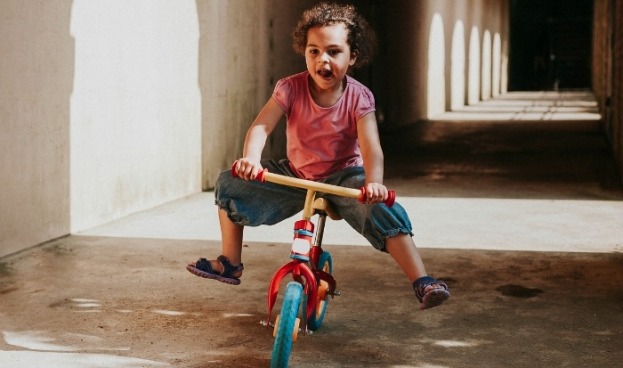"Doing nothing usually leads to the very best of something.”
— Winnie the Pooh, from the movie Christopher Robin
Once upon a time we knew how to play. We would run outside with the screen door banging behind us, grab our bike by the handlebars, and pedal off to unknown adventures. We might meet our friends, find new friends, or just be alone with imaginary ones. Play was as natural and normal as eating and sleeping.
But something happened. We grew up, and the indulgence of play became something close to sin. By young adulthood, when responsibilities of work and family began to mount, cutting the frivolities was the obvious course. If we stopped working, someone else might take our place. We might lose out; we might not succeed! Our hyper-competitive society drills this into our young psyches and who are we to question?
By middle age, our self-image has been absorbed by work, and sometimes our very self-worth becomes hostage. Doesn't work make us worthy? Even the most noble causes can sweep us up into the belief that we are indispensable, that, if we let go, the entire house of cards will collapse: What if I stop? Will the world end? Will I be tagged as lazy and irresponsible? Will I lose my sense of worth? When I retire, what will become of me? Who will I be then?
The antidote to these fears is reuniting ourselves with the world of play. My favorite purveyor of this grown-up wisdom is Winnie the Pooh. In the film Christopher Robin, Pooh finds his old friend Christopher Robin all grown-up with a family to support and a demanding boss to placate. With his gentle honey-bear wisdom, Pooh nudges his stressed-out friend to rediscover his capacity for play. Like a Zen master, Pooh explains that "doing nothing usually leads to the very best of something." And so, because no one can resist Pooh, Christopher Robin finally gives up his relentless, unhappy striving and rediscovers himself again through play.
In a recent article in the New York Times, "You Are Doing Something Important When you Aren't Doing Anything," author Bonnie Tsui seems to be channeling Winnie the Pooh. She refers to play as "fallow time," that is, part of the work-cycle, a time to refuel our spirits, leading to more productive and creative work when we return to it. Tsui explains, "Fallow time is necessary to grow everything from actual crops to figurative ones, like books and children. To do the work, we need to rest, to read, to reconnect. It is the invisible labor that makes creative life possible."
And so it is for the soul. A depleted soul needs fallow time to regenerate the nutrient balance. On the other side of the "work-cycle" we discover that we do, in fact, have a self that exists outside of the world of relentless doing. When we play, we become acquainted with this larger sense of self. We discover pieces of the soul that can only be found by sauntering down the path of doing-nothing-in-particular.
According to Mary Ann and Frederic Brussat, creators of the Alphabet of Spiritual Literacy, play is a spiritual practice. The letter "P" is not for Producing or Promoting or Penciling-in a new task on your calendar. P is for Play. Think about that. If there is no play, you might get things done and impress others, but you won't get to that "very best something" that Pooh talks about. You may "gain the whole world but lose your soul," as Jesus says.
Doing nothing is, indeed, filled with something! Divine possibilities thrive in fallow ground. Creativity is born in the quiet, dark, invisible places. It happens without our conscious knowing when we walk along a shore or in the deep green woods. It happens when we escape to places of imagination. Divinity invites us to play, to dance, to get outside of ourselves and join in the "other" world, the one we knew as children. As co-creators with God, we would do well to accept this invitation to meet in a special place and play. This is where the balance of soul-nutrients finds restoration and fertility. This is where we find transformation and healing in a world bent on burning us out.
So, if your spirit feels depleted by too much work or too much news or too much monotony, try this: Do nothing — that is, nothing goal oriented. Go outside and play. Ramble about in a park or take a road trip with no particular destination. Play with children — who are the experts, after all. Play with your dog. Play with recipes or with yarn or with wood. Pick up your guitar. Read novels and watch movies that escort you into imaginary worlds. Set yourself in a new place. Open yourself up to novelty and surprise and laughter. Or simply take a nap. As Pooh says, "People say that nothing is impossible, but I do it all the time."
If you still have trouble letting go, think of play as a form of resistance. Say," No!" to the world's time-is-money philosophy. Say, "No!" to the internal pressures of worthiness-by-work. Say, "No!" to the delusion that you are indispensable. Let it all go. At least for a while. The world, with all its troubles, will still be here when you return. Pick up a red balloon and walk down the path of a playful spirituality, the path Meister Eckhart calls "beautiful and pleasant and joyful and familiar."

 "P" is for Play
"P" is for Play